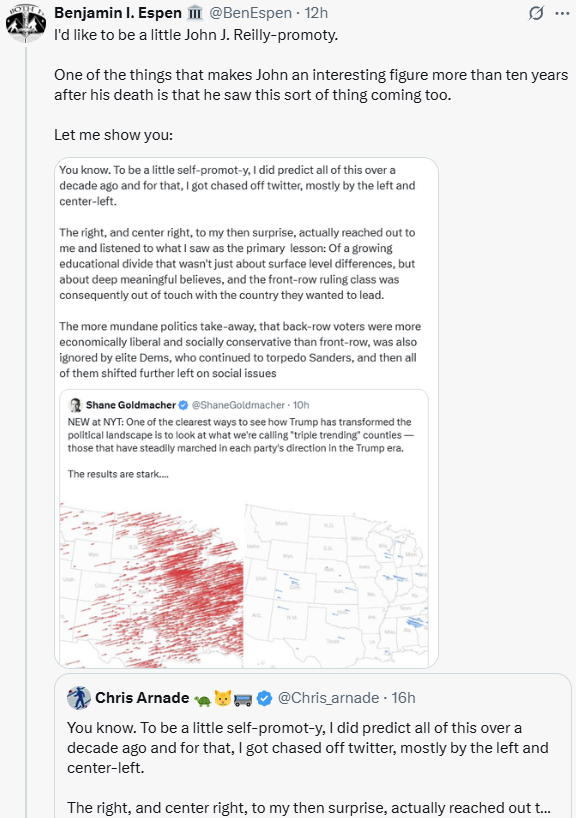The Long View 2004-12-05: Feral Awakenings

Søren Kierkegaard
I had forgotten John's idea that the 1960s was another Great Awakening.
Feral Awakenings
The Other Spengler, the one at Asia Times, has these disconcerting thoughts on the nature of the periodic Awakenings in American history, and why America is immune to Europe's morbid agnosticism:
Within the European frame of reference, there is no such thing as American Christendom - no centuries-old schools of theology, no tithes, no livings, no Church taxes, no establishment - there is only Christianity, which revives itself with terrible force in unknowing re-enactment of the past. It does not resemble what Europeans refer to by the word "religion". American Christianity is much closer to what the German pastor Dietrich Bonhoeffer, writing in 1944 from his cell in Adolf Hitler's prison, called "religionless Christianity". Soren Kierkegaard, I think, would have been pleased.
To this I would make three responses:
(1) America really does produce first-class theologians. On the other hand, one might argue that America also produces first-class composers in the classical tradition, but their work is not what we mean by American music.
(2) An Awakening is not happening now; the last Awakening happened in the 1960s and 1970s. What we see now is its institutionalization.
(3) Nothing would please Soren Kierkegaard.
* * *
The last Awakening had its Left and Right wings. Environmentalism moved to the Left, where it quickly began to perform a religious function for people who believed they had left religion behind. Indeed, the crusading spirit of environmentalism now threatens to go cosmic: Scientists propose conservation parks on Mars:
Space Policy
There are good reasons and bad reasons for going to Mars. One of the best is to get away from the sort of eco-fascists who have prevented human settlement of Antarctica. As for me, I am approaching the point where I oppose the environment in all its forms.
* * *
The December issue of The New Oxford Review has slightly irate letters from Avery Cardinal Dulles, S.J., and George Weigel in which they try to answer the magazine's most recent distortions of their views. This is wasted effort. It is pretty clear by this point that NOR tries to draw attention to itself by picking fights like this. In any case, we should not forget the old precept: "Do not argue in public with a crazy person, because passersby might not be able to tell you apart."
And what is the crazy man saying these days? Look at this editorial reply to another letter, this one from a National Guardsman who argued that the war against Islamicism is necessary:
Yes, Muslim terrorists from Chechnya killed hundred of innocent school children in Russia, and that's absolutely evil. (No one claims it had anything to do with Israel.) America, on the other hand, has killed far, far more innocent school children in our fire bombing of Dresden, our atomic bombing of Hiroshima and Nagasaki, and in Vietnam. Innocent civilians were *intentionally* targets. If you can justify our terrorist acts (and many Catholics do), then you cannot object to Muslim terrorism...[Regarding the Islamization of the West] Perhaps a good persecution is what the American and European Church needs. Most Catholic dissenters lack sufficient faith to withstand persecution and would peel away, and the fag priests and bishops would likely renounce their Catholicism in a heartbeat..[But if you fight the Islamicists?]..Ah, but you wouldn't even be killing Muslims for your country; you'd be doing it for another country, Israel...
My misgivings from several years ago about a rapprochement between Islam and orthodox Christianity have been amply borne out.
* * *
On the other hand, there is less to some craziness than meets the eye. Consider this review in today's New York Times by the estimable Bernard-Henri Levy:
Our Oldest Enemy
Books like this are not examples of American lunacy. They are examples of American humor. French-bashing is a practical joke; it does not really express how Americans feel about France. Trust me on this.
Copyright © 2004 by John J. Reilly



Comments ()